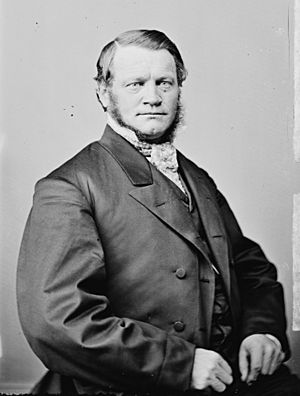Josiah Bushnell Grinnell facts for kids
Quick facts for kids
Josiah Bushnell Grinnell
|
|
|---|---|
 |
|
| Member of the U.S. House of Representatives from Iowa's 4th district |
|
| In office March 4, 1863 – March 3, 1867 |
|
| Preceded by | Constituency established |
| Succeeded by | William Loughridge |
| Member of the Iowa Senate | |
| In office 1856–1860 |
|
| Personal details | |
| Born |
Josiah Bushnell Grinnell
December 22, 1821 New Haven, Vermont, U.S. |
| Died | March 31, 1891 (aged 69) Grinnell, Iowa, U.S. |
| Political party | Republican |
| Spouse | Julia Chapin |
| Education | Oneida Institute Auburn Theological Seminary (BA) |
| Signature | |
Josiah Bushnell Grinnell (December 22, 1821 – March 31, 1891) was an important person in American history. He was a U.S. Congressman from Iowa. He was also a minister, which means he led a church. Grinnell is famous for founding the town of Grinnell, Iowa, and for helping to create Grinnell College.
Contents
Early Life and Education
Josiah Grinnell was born in New Haven, Vermont, in 1821. He started his studies at Oneida Institute in 1841. Later, he graduated from Auburn Theological Seminary in New York City in 1847. After finishing school, he worked as a minister in places like Washington, D.C., and New York City.
Grinnell eventually moved to Iowa. He is known for a famous piece of advice given to him by a newspaper editor named Horace Greeley. Greeley told him, "Go West, young man," which meant he should move to the western parts of the country for new opportunities.
Founding Grinnell and the College
Josiah Grinnell played a big part in building new things. He helped create the town of Grinnell, Iowa. He was also very involved in building railroads, which were important for travel and trade back then.
He was key in moving Grinnell College, which was first called Iowa College, from Davenport to the new town of Grinnell. This helped the college grow and become an important school.
Family Life
Josiah Grinnell married Julia Ann Chapin on February 4, 1852. They had four children together. Their children were named Catharine Hastings Grinnell, George Chapin Grinnell, Mary Chapin Grinnell, and Carrie Holmes Grinnell.
Public Service in Iowa
After moving to Iowa, Grinnell became involved in politics. He was elected to the Iowa Senate, where he served from 1856 to 1860. While serving as a senator, he also studied law. He became a lawyer in 1858 and started his own law practice in Grinnell.
In 1860, he was chosen as a delegate for the 1860 Republican National Convention. This was the meeting where Abraham Lincoln was chosen to run for President.
Helping the Underground Railroad
Josiah Grinnell was a strong supporter of ending slavery. He was a "conductor" on the Underground Railroad. This was a secret network that helped enslaved people escape to freedom.
He also helped John Brown, a famous abolitionist. In 1859, Grinnell gave shelter to John Brown after Brown's actions against slavery in Kansas and Missouri.
Serving in Congress
In 1862, Iowa gained more seats in the U.S. House. Grinnell ran for one of these new seats, representing Iowa's 4th congressional district. He won the election and served in the Thirty-eighth Congress.
He was re-elected in 1864 and served in the Thirty-ninth Congress. During his time in Congress, he sometimes had strong disagreements with other politicians.
Grinnell tried to get elected for a third term in 1866, but he lost the nomination to Judge William Loughridge.
Later Career and Legacy
After leaving Congress, Grinnell went back to practicing law. He continued his interest in railroads, becoming a director for the Rock Island Railroad. He also served as the president of the Iowa State Horticultural Society and the First National Bank in Grinnell.
Josiah Bushnell Grinnell passed away at his home in Grinnell on March 31, 1891. He is remembered for his work in politics, his efforts against slavery, and for founding the town and college that bear his name.
Images for kids
See also
- List of United States Congress members killed or wounded in office


